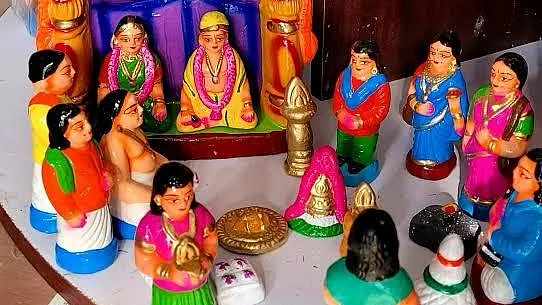Kancheepuram artisans face crisis as US high tariffs stall Golu Doll exports
Indian families living abroad, particularly in the US, place bulk orders for these dolls during Navaratri to recreate the festive atmosphere of home

Traditional artisans in Kancheepuram are grappling with a severe livelihood crisis after thousands of hand-crafted ‘golu dolls’ remain unsold due to a recent 50 per cent additional import duty imposed by the United States.
Every year, Indian families living abroad, particularly in the US, place bulk orders for these dolls during Navaratri to recreate the festive atmosphere of home. This year, however, the steep tariff has deterred buyers, leaving artisans in Tamil Nadu with stockpiles of unsold products.
Around 50 families across four streets near the historic Varadaraja Perumal temple have been engaged in golu doll-making for four to five generations.
The craft forms their sole source of income, with dolls traditionally sold across Tamil Nadu and neighbouring states including Andhra Pradesh, Telangana, Karnataka, and Kerala.
Exports to countries such as the US, Canada, Germany, and the UK have historically provided vital income, with the US remaining the largest overseas market.
“NRIs in the US always placed bulk orders for Navaratri. The income from foreign buyers is much higher than domestic sales. This year, because of the additional import duty, people are hesitant to order, and our sales have crashed,” said one doll maker.
Compounding the crisis, courier and postal services to the US have suspended shipments, leaving consignments stranded in Kancheepuram. With Navaratri approaching, thousands of dolls painstakingly crafted over months are piled up in workshops and storerooms, threatening the artisans’ annual earnings.
Festival seasons such as Krishna Jayanthi, Vinayaka Chaturthi, and Navaratri usually account for the bulk of these artisans’ yearly income. The sudden disruption has left many in deep financial distress, with fears that without urgent intervention, this centuries-old tradition could fade away.
Artisans have appealed to both the state and central governments for support, urging government-run handicraft bodies to purchase dolls in bulk and advocating for subsidies similar to those provided to fishermen during the annual fishing ban.
“Navaratri is around the corner, and we are sitting with unsold dolls worth crores. Without help, we don’t know how to survive,” one artisan said, highlighting the uncertainty clouding their future.
Follow us on: Facebook, Twitter, Google News, Instagram
Join our official telegram channel (@nationalherald) and stay updated with the latest headlines
